
- Average Rating:
- Not yet rated
- Topic Areas:
- Psychotherapy | Speeches | Therapist Development
- Categories:
- Evolution of Psychotherapy | Evolution of Psychotherapy 2021
- Faculty:
- Derald Wing Sue, PhD
- Course Levels:
- Master Degree or Higher in Health-Related Field
- Duration:
- 1 hour
- Format:
- Audio and Video
- Original Program Date:
- Dec 03, 2021
- Short Description:
- "In the United States, the omnipresence of racial bias and bigotry has led many to question the reasons for their persistence in light of widespread public condemnation. Social scientists have proposed a number of reasons for people’s failure to act: (a) the invisibility of modern forms of bias, (b) trivializing an incident as innocuous, (c) diffusion of responsibility, (d) fear of repercussions or retaliation, and (e) the paralysis of not knowing what to do. This presentation is aimed at addressing the last reason by providing participants with a repertoire of anti-bias strategies and tactics to overcome the expressions of microaggressions.
- Price:
- $59.00 - Base Price

- Average Rating:
- Not yet rated
- Topic Areas:
- Topical Panels
- Categories:
- Evolution of Psychotherapy | Evolution of Psychotherapy 2021
- Faculty:
- Sue Johnson, EdD | Peter Levine, PhD | Donald Meichenbaum, PhD | Elaina Gil
- Course Levels:
- Master Degree or Higher in Health-Related Field
- Duration:
- 1 hour
- Format:
- Audio and Video
- Original Program Date:
- Dec 03, 2021
- Short Description:
- Every therapist needs a method to work with post-traumatic stress disorder. Fundamental techniques will be discussed. Neurological considerations will be offered.
- Price:
- $59.00 - Base Price
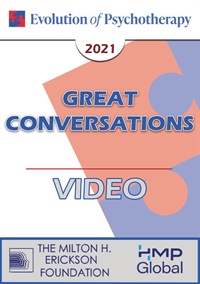
- Average Rating:
- Not yet rated
- Topic Areas:
- Great Conversations | Psychoanalysis | Psychotherapy
- Categories:
- Evolution of Psychotherapy | Evolution of Psychotherapy 2021
- Faculty:
- Otto Kernberg, MD
- Course Levels:
- Master Degree or Higher in Health-Related Field
- Duration:
- 1 hour
- Format:
- Audio and Video
- Original Program Date:
- Dec 03, 2021
- Short Description:
- A Great Conversation featuring Otto Kernberg, MD, from the 2021 Evolution of Psychotherapy Conference.
- Price:
- $59.00 - Base Price
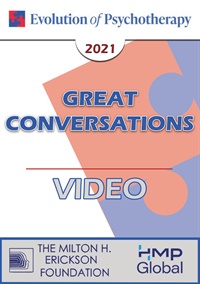
- Average Rating:
- Not yet rated
- Topic Areas:
- Great Conversations | Psychotherapy | Therapist Development
- Categories:
- Evolution of Psychotherapy | Evolution of Psychotherapy 2021
- Faculty:
- Donald Meichenbaum, PhD
- Course Levels:
- Master Degree or Higher in Health-Related Field
- Duration:
- 1 hour
- Format:
- Audio and Video
- Original Program Date:
- Dec 03, 2021
- Short Description:
- Unlike surgeons, psychotherapists usually do not get better with years of practice. Why is that? What skills are most important to develop in clinical training programs, and does it actually happen? Should we be focusing on evidence-based treatment techniques, interpersonal therapeutic skills, cultural competence, deliberate practice, scientific skepticism, fostering clients' strengths and resilience? Three seasoned clinical trainers reflect on the joys, challenges, and outcomes of preparing future psychotherapists.
- Price:
- $59.00 - Base Price
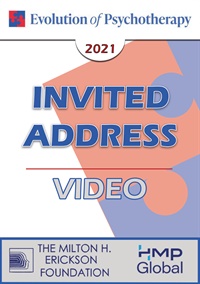
- Average Rating:
- Not yet rated
- Topic Areas:
- Femininity | Gender | Invited Addresses
- Categories:
- Evolution of Psychotherapy | Evolution of Psychotherapy 2021
- Faculty:
- Carol Gilligan
- Course Levels:
- Master Degree or Higher in Health-Related Field
- Duration:
- 1 hour
- Format:
- Audio and Video
- Original Program Date:
- Dec 03, 2021
- Short Description:
- Has research on girls' development changed our understanding of women's psychology? What are we to make of the frank and fearless voices of girls such as Greta Thunberg (with her climate strike) and Amanda Gorman (the poet at Biden's inauguration)? How can we understand women's silences?
- Price:
- $59.00 - Base Price
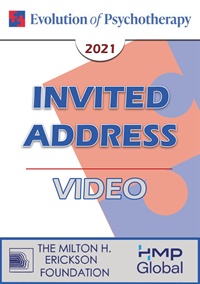
- Average Rating:
- Not yet rated
- Topic Areas:
- Invited Addresses | Multicultural | Pain and Healing
- Categories:
- Evolution of Psychotherapy | Evolution of Psychotherapy 2021
- Faculty:
- Helen Neville
- Course Levels:
- Master Degree or Higher in Health-Related Field
- Duration:
- 1 hour
- Format:
- Audio and Video
- Original Program Date:
- Dec 03, 2021
- Short Description:
- In this presentation, Dr. Helen Neville will present the Psychology of Radical Healing framework. The heuristic is designed to describe the ways in which Black, Indigenous, and People of Color engage in individual and collective healing from identity based wounds. She will focus her discussion on the dimension of radical hope. After highlighting research findings, she will describe current interventions that promote specific aspects of radical healing. Specific practice recommendations will be offered.
- Price:
- $59.00 - Base Price
Tags: Multi-Cultural Pain & Healing
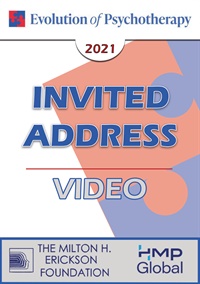
- Average Rating:
- Not yet rated
- Topic Areas:
- Invited Addresses
- Categories:
- Evolution of Psychotherapy | Evolution of Psychotherapy 2021
- Faculty:
- Elizabeth Loftus, PhD
- Course Levels:
- Master Degree or Higher in Health-Related Field
- Duration:
- 1 hour
- Format:
- Audio and Video
- Original Program Date:
- Dec 03, 2021
- Short Description:
- An Invited Address featuring Elizabeth Loftus, PhD, from the 2021 Evolution of Psychotherapy Conference.
- Price:
- $59.00 - Base Price
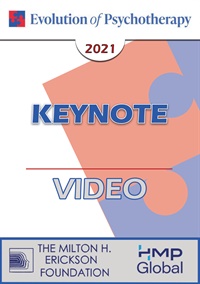
- Average Rating:
- Not yet rated
- Topic Areas:
- Keynotes | Therapist Development
- Categories:
- Evolution of Psychotherapy | Evolution of Psychotherapy 2021
- Faculty:
- John Gottman, PhD | Julie Gottman, PhD
- Course Levels:
- Master Degree or Higher in Health-Related Field
- Duration:
- 1 hour
- Format:
- Audio and Video
- Original Program Date:
- Dec 03, 2021
- Short Description:
- A Keynote featuring John Gottman, PhD, and Julie Gottman, PhD, from the 2021 Evolution of Psychotherapy Conference.
- Price:
- $59.00 - Base Price
Tags: Therapist Development
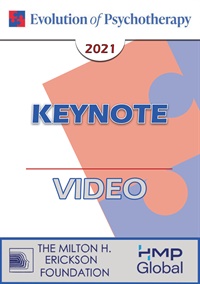
- Average Rating:
- Not yet rated
- Topic Areas:
- Addiction | Attachment | Couples Therapy | Keynotes | Love | Relationships
- Categories:
- Evolution of Psychotherapy | Evolution of Psychotherapy 2021
- Faculty:
- Helen E. Fisher, PhD
- Course Levels:
- Master Degree or Higher in Health-Related Field
- Duration:
- 1 hour
- Format:
- Audio and Video
- Original Program Date:
- Dec 03, 2021
- Short Description:
- Is technology changing love? Why do you fall in love with one person rather than another? Why is the rejected brain primed for psychotherapy? How can you use neuroscience to keep love alive? And where are we headed in our digital age? Anthropologist and neuroscientist Dr. Helen Fisher uses her brain scanning work (fMRI) to discuss three basic brain systems that evolved for mating and reproduction--the sex drive, romantic love, and attachment; each plays a pivotal role in human health and happiness. And she uses her data on 50,000 single Americans to explain a new (and positive) trend in courtship, what she calls “slow love.” She then discusses her data on the biological foundations of human personality—specifically four basic styles of thinking and behaving that impact love relationships and all other social interactions.
- Price:
- $59.00 - Base Price
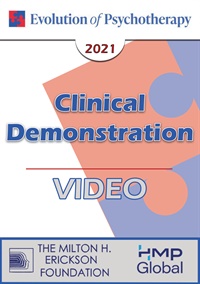
- Average Rating:
- Not yet rated
- Topic Areas:
- Belief Systems | Clinical Demonstrations
- Categories:
- Evolution of Psychotherapy | Evolution of Psychotherapy 2021
- Faculty:
- Robert Dilts, BA
- Course Levels:
- Master Degree or Higher in Health-Related Field
- Duration:
- 1 hour
- Format:
- Audio and Video
- Original Program Date:
- Dec 03, 2021
- Short Description:
- Our beliefs exert a very powerful force on our behavior. Our beliefs about ourselves and what is possible in the world around us greatly impact our capacity for change and healing. Limiting beliefs, or belief barriers, can act like an invisible force that interfere with our capacity to be resourceful and trap us in unhealthy patterns of behavior. Empowering beliefs help us to identify and take best advantage of potential opportunities. This demonstration will show how to identify and transform belief barriers by integrating somatic and emotional intelligence to create an empowering "belief bridge."
- Price:
- $59.00 - Base Price
Tags: Belief Systems
Please wait ...

